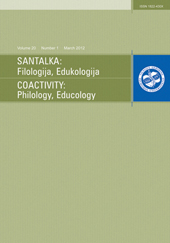Veiksmažodžių abstraktų semantiniai pokyčiai
Semantic Changes of Gerund
Author(s): Zofija BabickienėSubject(s): Language and Literature Studies
Published by: Vilnius Gediminas Technical University
Keywords: semantic models; Lithuanian language; gerund; semantic derivation; semantic changes; scientific style; componential analysis
Summary/Abstract: In this article, semantic models of gerund in the Lithuanian language are being investigated. Their productivity and the reasons of their change in the Lithuanian language are identified. The tendency to use gerund semantic structure in noun constructions is typical not only in Greek or Latin languages but also in English, Russian, etc. Regular polysemy is regarded as semantic derivation, i. e. shifting from main meanings to derivative ones. The object of this investigation is the usage patterns of gerunds which bear both the meaning of a verb and a noun. The examples for the present study have been gathered from the language of different Lithuanian dialects as well as from the Dictionary of the Lithuanian language (different volumes), etc. The research results reveal that semantic changes of object and result are the most productive, whereas mood or time semantic model proved to be not so productive. The productivity of regular models depends on the fact that there are suffix derivatives which have the meaning of a result. The research shows that scientific style and language of different dialects are rich in the use of gerund.
Journal: Santalka: Filologija, Edukologija
- Issue Year: 20/2012
- Issue No: 1
- Page Range: 18-25
- Page Count: 8
- Language: Lithuanian

